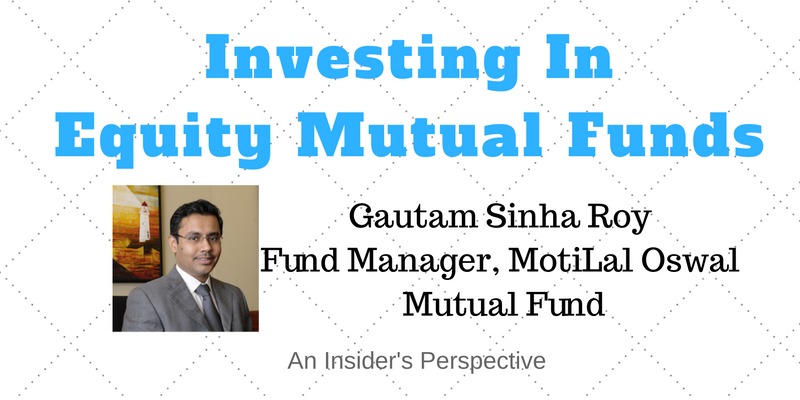This fund manager interview post originally appeared on www.unovest.co. Here’s an extract from the interview.
As a part of the Insider’s view series, we bring to you insights shared by Gautam Sinha Roy, Fund Manager of the MOSt Focused Multicap 35 Fund (Equity component) at Motilal Oswal AMC.
Gautam has more than 11 years of rich experience in fund management and research. Previously, he has had stints with Motilal Oswal Securities Limited in the Investments and Market Strategy teams.
He was also with Motilal Oswal Securities Ltd. where he was managing the company’s investments book. In the past, he has worked with IIFL Capital Pvt. Ltd., Mirae Asset Global Investment Pvt. Ltd., Edelweiss Capital Ltd. and Genpact Ltd before joining the Motilal Oswal group.
VK: Welcome Gautam!
Thanks for agreeing to this interview.
Interest in equity investing, direct or through mutual funds, is rising. However, the foundation that is required to benefit from equity investing is still missing.
The purpose of our conversation today is to enable investors to understand how they can make the most of equity investing. I am sure investors will appreciate it coming from a fund manager like yourself.
Should we begin?
Gautam: Yes.
VK: OK. Let’s start with the most fundamental question. What does stock or equity mean to you?
Gautam: Equity to me is the best asset class for long-term wealth creation. If you study the lists of the world’s richest, most of them created wealth from one or a few concentrated equity holdings, very often their own companies.
While the lay investor might not have the entrepreneurial skill to create his own company, he can easily participate in the wealth creation journeys of other competent entrepreneurs through buying small stakes in their businesses.
VK: What are the ways in which one can lose money investing in equities? How can one maximise the chances of making equity work for their investments?
Gautam: One can lose money in equities by only two means (investing in unworthy companies) and not being patient. Due to the inherent volatility in equity, it is quite common for investors to lose patience (and hence money) in a downturn.
Equity investing works best when you do the following two:
- Buy a winning, profitable and growing company at a fair price.
- Remain invested in for the long term or at least till it remains a winning, profitable and growing company and it has not become crazily expensive.
VK: When should one invest in direct stocks and when should one invest through an equity mutual fund? What problem does an equity mutual fund solve?
Gautam: There are at least 500 listed companies, which are worth monitoring. Analysing companies requires strong understanding of:
- Accounting, which is the language of business
- Business strategy and economics
The knowledge involved here is essentially cumulative. When a 20 year experienced fund manager picks a stock, he is bringing in at least 20,000 hours (20 years X 200 days/year X 5 hours/day) of practice/ experience into that one single decision.
He is also well supported by a strong ecosystem around him. Fat chance that a lay investor can beat that! A lay investor should invest in a company where he has a true edge in understanding the business and its prospects.
Equity mutual funds serve the fundamental human economic need of compounding your savings at a rate superior to inflation, thus enhancing the purchasing power of your wealth.
VK: What is the answer to one fund that I should invest in? Is a multi-cap fund the answer to “which one fund should I invest in?”
Gautam: Yes, a broad spectrum Multicap fund with a lock-in period of at least 3/5 years is the one stop optimum solution for most investors.
VK: What factors determine your personal choice of an equity mutual fund?
Gautam: These would include:
- Understanding the investment philosophy and process being followed.
- The experience and track record of the fund management team.
- Fund management style being followed.
All these are critical in evaluating mutual funds for investment purposes.
VK: What would you see as warning signs / red flags to reconsider a mutual fund investment?
Gautam: Major disruptions in the process being followed would be a key red flag. This could be difficult to spot for the lay investor.
A regular monitoring of the portfolio for any sign of deviation from normal is the way to spot this. One example could be a massive unexplainable churn in the portfolio with change in the type of stocks being bought (could be exemplified by large increase in Beta of the fund).
VK: Investors tend to sell funds when they rise in certain value and buy other funds. Is the concept of profit booking by investors applicable to mutual fund investments?
GSR: The investor should judge any fund on its current merit alone and little else. Profit booking for the sake of it does not make any rational sense to me.
I am however not asking investors to not take money from the table. What they should ideally do, is remember that these are long term investments and let them run their full course. Profit booking in haste could be akin to plucking half-ripened fruits and hence not an optimal choice.
To read the remaining part of the interview with Gautam and more of the insights he offers, please click here.
